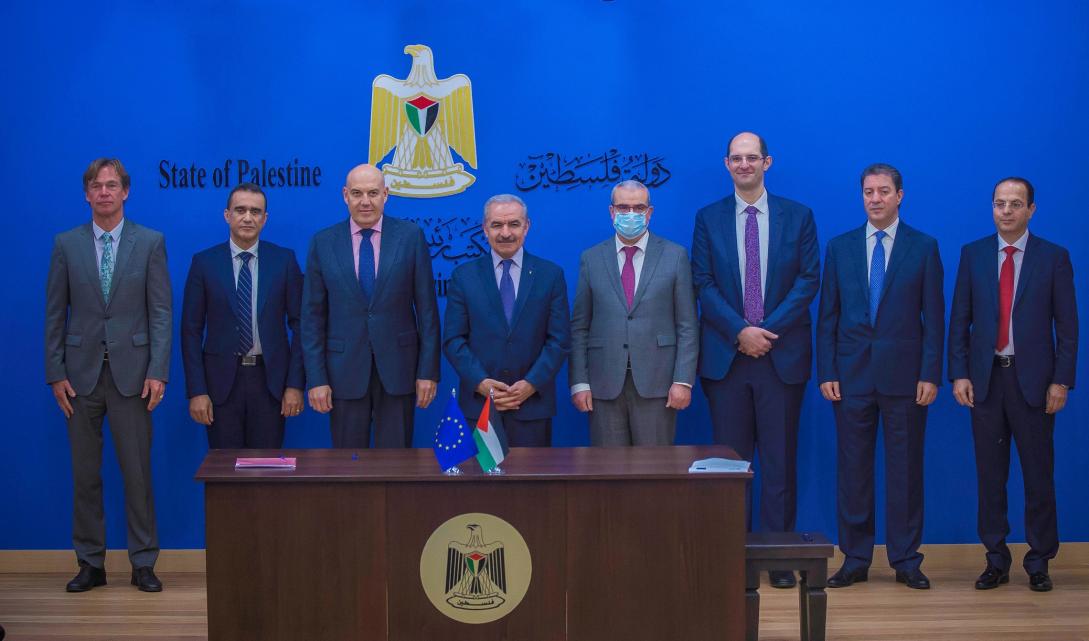The EU–Palestine Investment Platform meets for the second time, while the EU Bank steps-up its support to Palestine making available USD 425 million in finance for the private sector

The European Union Representative, the Palestinian Prime Minister and representatives of several European Financial Institutions met today for the second time in a high-level format discussing cooperation in the area of investment. On the margins of the meeting, the European Investment Bank with support of the European Union has signed a package of agreements worth USD 425 million in debt and risk sharing instruments for the benefit of the Palestinian private sector.
The EU – Palestine Investment Platform has been established by the EU and the Palestinian Authority in an effort to foster policy dialogue on investment and to help better identify, prioritise, coordinate and promote investment opportunities that the EU External Investment Plan offers in Palestine.
Today on the margins of the second meeting of the Platform, the European Investment Bank has signed seven agreements amounting to an unprecedented total sum of USD 425 million to support Palestinian SMEs and micro-entrepreneurs. The initiative represents a coordinated effort between the EU and the EIB and forms part of the overall Team Europe initiative, which aims to support sustainable social and economic recovery from the Covid-19 crisis in partner countries. Following agreements were signed in a dedicated ceremony.
The EIB signed three lines of credit with Bank of Palestine, Quds Bank and Palestine Investment Bank in the amount of USD 50 million, USD 32 million and USD 20 million, respectively, which will be on-lent to local SMEs, support job creation and Palestine’s economic resilience. The EIB also signed a Letter of Intent with the Palestine Monetary Authority (PMA) with a view to making available USD 200 million in credit for on-lending to SMEs and micro-entrepreneurs, which will contribute to the PMA’s efforts to promote economic development and to provide financial relief to local SME’s impacted by the multiple recent crisis, including the Covid-19 pandemic and the hostilities in Gaza.
These lines of credit fall under the EU-EIB Economic Resilience Initiative (ERI), which is part of the EU’s response to the challenges in the Southern Neighbourhood and amongst its primary objectives intends to promote private sector development through the support to SMEs as key players for generating economic growth and employment.
In addition, the EIB signed two risk-sharing agreements with The National Bank and Bank of Palestine, which are expected to support a new portfolio of SME loans in a combined amount of at least USD 120 million focusing particularly on vulnerable and marginalised groups of the economy. These risk sharing instruments are backed by the European Fund for Sustainable Development (EFSD), the EU’s Guarantee Fund operating in the Neighbourhood region, and represent the first type of such agreements ever signed in Palestine since the launching of the fund.
The EIB also signed a loan agreement with Vitas Palestine in the amount of USD 3.3 million to support small loans to micro- and very small enterprises. The loan is expected to reach out to about 1,200 micro-entrepreneurs in Palestine and comes as a top-up of the USD 5 million facility signed in December 2017. It aims to improve the resilience of the micro-finance sector to cope with the economic impact of the Covid-19 pandemic and is part of the EU-EIB Risk Capital Facility for the Southern Neighbourhood (RCF).
Alongside the financial support, the EIB and the EU are also committed to provide a comprehensive technical assistance programme aiming to support the development of an inclusive financial sector and to reduce asymmetry of information between banks and SMEs, thus improving access to finance in general and in particular for underserved and vulnerable groups of the economy, including SMEs impacted by Covid-19 crisis, start-ups, women- and youth-owned businesses.
Prime Minister Dr. Muhammad Shtayyeh said during the ceremony: “This is a significant, timely agreement that intersects with the Palestinian government’s goals and priorities to support and strengthen the private sector, especially SMEs that have been affected by the Covid-19 pandemic. We thank the EU and the European Investment Bank, for this strategic partnership. Europe has always been on the side of Palestine politically while providing economic support and building the institutions, in order to establish an independent and sovereign Palestinian state along the 1967 borders with East Jerusalem as its capital.“
The European Union Representative, Sven Kühn von Burgsdorff said: “Six months after the first meeting of the EU-Palestine Investment Platform, I am very pleased to witness today a historic signature ceremony dedicating support to the Palestinian private sector with an unprecedented amount of finance and through innovative instruments. This support comes in a period when Palestine is going through a difficult time and it demonstrates that in spite of the many challenges Palestine does offer viable business opportunities worth investing in. This package of financing will contribute to strengthening the Palestinian economy, contributing to economic independence, prosperity and welfare.“
Commenting on the above transactions, Werner Hoyer, the EIB President, said: “Small and medium companies account for 95% of the Palestinian economy and play a vital role in creating and safeguarding employment, especially for young people and women. This comprehensive package will enhance access to much-needed financial support for Palestinian private sector in the midst of the current, unprecedented crisis. As the EU Bank and a key contributor to Team Europe, we value our partnership with local intermediaries who will implement the schemes with us.”
Background information
The European Investment Bank (EIB) is one of the leading development finance players in the Mediterranean region. The Bank’s goal is to supporteconomic and social development by improving people’s living conditions. EIB aims to establish a tangible presence in the partner countries, focusing on the economic and social priorities of the beneficiary countries to which it not only contributes its financing capacity but also adds value in project implementation and modernisation of public policies through its technical and financial expertise and advisory services.
The EU’s ambitious External Investment Plan (EIP) has been set up to encourage investment in its partner countries. It is promoting inclusive growth, job creation and sustainable development. The EIP is crowding in private investors, where viable business proposals meet social needs, and where limited public funds can attract private money.
The EU–Palestine Investment Platform was established in December 2020 in order to support the roll-out of the EU External Investment Plan in Palestine. It works to foster policy dialogue between the EU, the PA, European Financial Institutions and other local and international stakeholders on how to better attract investment into Palestine. The platform was set up to help identify, prioritise, coordinate and promote investment opportunities that the EU External Investment Plan offers through its instruments. This coordination mechanism serves to discuss policy priorities and investment pipelines in order ensure alignment of publicly sponsored investments with political, policy and reform priorities of Palestine.
The Economic Resilience Initiative (ERI), approved by the EU Member States in 2016, consists of an integrated package of loans, concessional finance and innovative instruments designed to enable financing of an additional EUR 15 billion of investments on top of schemes already planned.
The Southern Neighborhood Microfinance Facility (SNMF) provides access to equity and debt financing to MSMEs in the Mediterranean region in order to support private sector development, inclusive growth and private sector job creation. It is a EUR 71.3 million facility which supports investments in microfinance markets in Southern Neighborhood countries. The facility blends EIB’s own resources with the European Commission resources under the Neighborhood Investment Facility.





